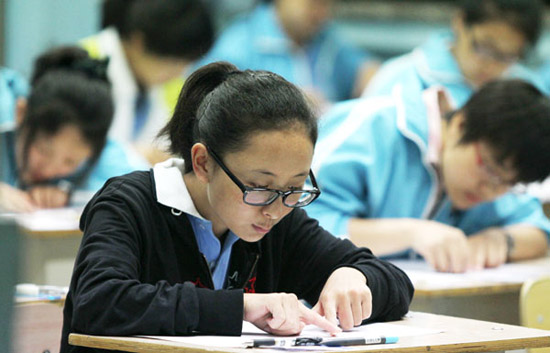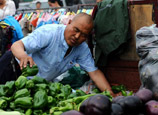
 |
| Students work on their exams at the exam site of Beijing Tibet Middle School in Beijing on Friday. Zhu Xingxin / China Daily |
Related Reading:
>> Migrant students can now take gaokao away from home
Move aimed at boosting equality in education system, officials say
Migrant students were allowed on Friday for the first time to take part in national college entrance exams away from their home regions, a move that officials say highlights efforts to boost equality in education.
"Although there are some strict requirements for migrant children to take the exams in Guangdong, the reform is a significant improvement in the educational system," said Guo Kaizhi, principal of Haizhu Middle School in Guangzhou, the capital of Guangdong.
The school has a large number of migrant students.
"According to the new rule, a growing number of students in the school will be allowed to take the gaokao after three years," Guo told China Daily.
The first batch of some 4,500 migrant students from 10 provinces and autonomous regions took the annual examination, or gaokao, which is the sole State-sanctioned way to access the nation's institutions of higher learning.
A migrant student is a person who has a registered permanent residency address, or hukou, that does not match his or her current residence.
In the past, students were allowed to attend primary and middle schools in the city where their parents worked and lived, but they had to go back to their hometowns to take the gaokao.
By the end of December, most provinces, municipalities and autonomous regions released detailed plans to reform the gaokao system for the children of migrant workers.
But in some big cities and regions, which have a large number of migrant workers, students will still need to wait some time to fully benefit from the new rules.
In Beijing, migrant students still cannot take the exams in 2013 and 2014. They're only allowed to attend secondary vocational schools from this year and higher vocational schools from next year. After finishing their studies at higher vocational schools, they can apply for universities.
Authorities in Shanghai said the new rules will allow non-resident children to enter senior high schools, and vocational schools and take the gaokao in 2014.
In Guangdong, migrant students will only be allowed to take the gaokao and compete with native residents on equal footing in 2016, although the southern province is the largest province in terms of the population of students taking part in the gaokao this year, with some 730,000 students expected to take the exams.
Migrant workers must meet some requirements, including having stable jobs and incomes, for their children to benefit from the new rules.



















![]()
